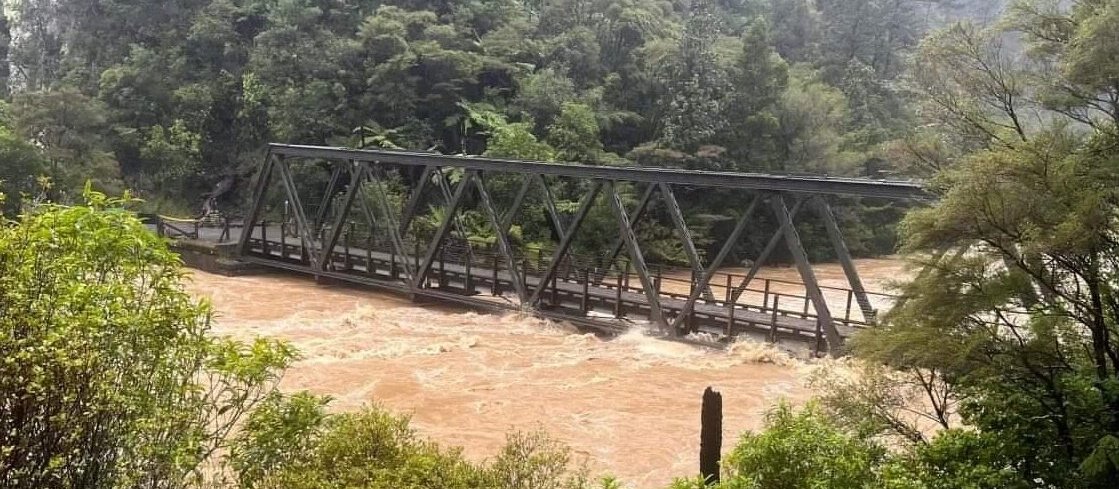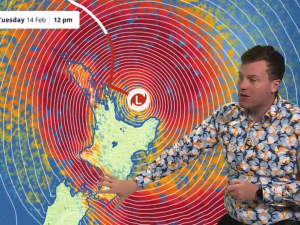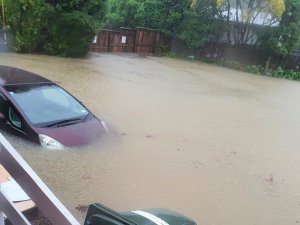Respiratory physician Lutz Beckert considers chronic obstructive pulmonary disease management, including the prevention of COPD, the importance of smoking cessation and pulmonary rehabilitation, and the lifesaving potential of addressing treatable traits. He also discusses the logic of inhaler therapy, moving from single therapy to dual and triple therapy when indicated, as well as other aspects of management
Cyclone Gabrielle closes practices from Northland to East Cape and beyond
Cyclone Gabrielle closes practices from Northland to East Cape and beyond

“Not being able to get any feedback from the people delivering primary care across Tairawhiti is really uncomfortable”
PHOs couldn’t get through to some general practices in Gisborne and Northland by late this morning after Cyclone Gabrielle wreaked havoc causing power and cellphone outages across many regions.
Other general practices are known to have closed their doors due to the cyclone’s impact and some are only offering virtual services.
Six regions from Northland to Hawke’s Bay called local states of emergency, leading to a national state of emergency being declared this morning due to the “unprecedented and dangerous weather event”. Tararua district was added this afternoon.
Hato Hone St John spokesperson Dans Oh says in a media statement that road closures and telecommunications were creating “challenges” for its ambulance service particularly in Hawke’s Bay, Coromandel and East Cape/Tairāwhiti.
Pinnacle Midlands Health Network medical director Jo Scott-Jones says while most of its practices are running today, some virtually, it had yet to hear by early afternoon from practices in Gisborne, which appears to be without power, internet and cellphone coverage.
“The hospital in Gisborne has got cellphone and internet coverage but it doesn’t appear that there’s cellphone or internet coverage outside of there,” the specialist GP told New Zealand Doctor Rata Aotearoa. “Certainly, we’re not getting any direct feedback from our practices over there.” Dr Scott-Jones describes that situation as “a worry” and “uncomfortable”.
Teams have been working hard to establish contact with staff in the Gisborne area, he says, but communication with the hospital indicates practices are closed as they have no power or methods of communication. The Gisborne Hospital emergency department is not currently overworked, he’s been told. However, it was still raining and the main bridge in town had been closed.
No damage to practices has been reported so far, says Dr Scott-Jones, aside from power outages across the Coromandel as well as some in Taranaki and Waikato. Some practices have opted to go to virtual consults today for staff and patient safety.
“I think there’ll be lots to learn from the response,” he says.
“Being in this position of not being able to get any feedback from the people delivering primary care across Tairāwhiti is really uncomfortable, and there’s not a lot that we could physically do because the roads are closed to actually get there.”
On the East Cape, which has been hit by repeated flooding and road closures in the past year, Ngāti Porou Hauora made the call yesterday to close its Puhi Kaiti, Uawa, Tokomaru Bay, Tawhiti, Ruatoria and Matakaoa clinics for both yesterday and today. But Te Puia Hospital remains open for emergencies.
Major power outages and extensive flooding in Hawke’s Bay also saw all general practices closed in that region by this afternoon, Te Whatu Ora Hawke's Bay said in a media statement. It has also forced a temporary emergency department to be stood-up in the GP-owned Napier Health Centre as flooding makes access from Napier to the main ED in neighbouring Hastings unsafe.
Mahitahi Hauora had activated its incident management plan with its first priority being to contact all the PHO’s practices, says the PHO’s communications manager Trish Hayward by email.
“As of this morning, 10 practices are open, three are closed, 10 have been impacted but are able to offer limited services remotely via telephone consults or triage, or on site with reduced staffing,” says Ms Hayward in the email response to New Zealand Doctor.
But there were three practices it was still trying to contact.
“Of the practices whose services have been impacted, the most common issues are staff unable to reach the clinic due to flooding and/or road closures, and problems with internet and/or phone connectivity for the clinic and staff trying to work remotely,” she says.
Ms Hayward says that any Northland practices that provide care to patients unable to access hospital services due to the current severe weather event are, as always, able to claim Primary Options funding.
The PHO is giving all practices regular updates and advice to help them manage the situation.
Specialist GP Emily Gill, of Te Kaha Medical Centre in the eastern Bay of Plenty, says the area is, “so far unscathed”, by the ex-tropical cyclone.
“I’m outside now and there’s no rain, no wind,” Dr Gill said just before midday.
“We have not lost power. We have not had reports of injuries. So we are operating our clinic. We had our staff spread up and down the coast ready to respond if required. We got spared the worst of the water and there has not been that much wind.
“The main issue is that the road, they are not letting main traffic through down the coast. They are still assessing the state of the roads. We can transport patients if required and patients can travel within this area that the clinic covers. I think the road block is just outside Opotiki.”
The Waka Kotahi New Zealand Transport Agency website said this morning the East Coast Road, State Highway 35, was closed from Okitu to Ōpōtiki.
Dan Ohs, Hato Hone St John deputy chief executive, emergency ambulance service, said in a media statement today that the ambulance workload has been “complex and steady over the last 48 hours”.
But Mr Ohs says no response times have been compromised as a result, though the organisation’s workload is expected to increase once the cyclone has passed.
“If we are unable to get to people due to the adverse weather impacting our response, paramedics in our communications centres will provide clinical advice and support for patients until physical contact can be safely established.
He says the service has continued to work closely with partner agencies to navigate the challenges caused by power outages, road access and telecommunications, particularly in Hawke’s Bay and East Cape/Tairāwhiti.
“We would like to give a big shout out to thank our crews, volunteers and the communities for their ongoing support, as well as a special thanks to our colleagues at Wellington Free Ambulance who are supporting us in our communications centres and in Coromandel, Whitianga and the East Cape.
“We will continue to implement a range of contingencies to maintain our ability to operate."

![Brookfields Bridge fails [Facebook, Cathleen Adams]](/sites/default/files/styles/cropped_image_4_3/public/2023-02/Brookfields%20Bridge%20fails.png?itok=BntlpBRG)





![Barbara Fountain, editor of New Zealand Doctor Rata Aotearoa, and Paul Hutchison, GP and senior medical clinician at Tāmaki Health [Image: Simon Maude]](/sites/default/files/styles/thumbnail_cropped_100/public/2025-03/Barbara%20Fountain%2C%20editor%20of%20New%20Zealand%20Doctor%20Rata%20Aotearoa%2C%20and%20Paul%20Hutchison%2C%20GP%20and%20senior%20medical%20clinician%20at%20T%C4%81maki%20Health%20CR%20Simon%20Maude.jpg?itok=-HbQ1EYA)
![Lori Peters, NP and advanced health improvement practitioner at Mahitahi Hauora, and Jasper Nacilla, NP at The Terrace Medical Centre in Wellington [Image: Simon Maude]](/sites/default/files/styles/thumbnail_cropped_100/public/2025-03/2.%20Lori%20Peters%2C%20NP%20and%20advanced%20HIP%20at%20Mahitahi%20Hauora%2C%20and%20Jasper%20Nacilla%2C%20NP%20at%20The%20Terrace%20Medical%20Centre%20in%20Wellington%20CR%20Simon%20Maude.jpg?itok=sUfbsSF1)
![Ministry of Social Development health and disability coordinator Liz Williams, regional health advisors Mary Mojel and Larah Takarangi, and health and disability coordinators Rebecca Staunton and Myint Than Htut [Image: Simon Maude]](/sites/default/files/styles/thumbnail_cropped_100/public/2025-03/3.%20Ministry%20of%20Social%20Development%27s%20Liz%20Williams%2C%20Mary%20Mojel%2C%20Larah%20Takarangi%2C%20Rebecca%20Staunton%20and%20Myint%20Than%20Htut%20CR%20Simon%20Maude.jpg?itok=9ceOujzC)
![Locum GP Helen Fisher, with Te Kuiti Medical Centre NP Bridget Woodney [Image: Simon Maude]](/sites/default/files/styles/thumbnail_cropped_100/public/2025-03/4.%20Locum%20GP%20Helen%20Fisher%2C%20with%20Te%20Kuiti%20Medical%20Centre%20NP%20Bridget%20Woodney%20CR%20Simon%20Maude.jpg?itok=TJeODetm)
![Ruby Faulkner, GPEP2, with David Small, GPEP3 from The Doctors Greenmeadows in Napier [Image: Simon Maude]](/sites/default/files/styles/thumbnail_cropped_100/public/2025-03/5.%20Ruby%20Faulkner%2C%20GPEP2%2C%20with%20David%20Small%2C%20GPEP3%20from%20The%20Doctors%20Greenmeadows%20in%20Napier%20CR%20Simon%20Maude.jpg?itok=B0u4wsIs)
![Rochelle Langton and Libby Thomas, marketing advisors at the Medical Protection Society [Image: Simon Maude]](/sites/default/files/styles/thumbnail_cropped_100/public/2025-03/6.%20Rochelle%20Langton%20and%20Libby%20Thomas%2C%20marketing%20advisors%20at%20the%20Medical%20Protection%20Society%20CR%20Simon%20Maude.jpg?itok=r52_Cf74)
![Specialist GP Lucy Gibberd, medical advisor at MPS, and Zara Bolam, urgent-care specialist at The Nest Health Centre in Inglewood [Image: Simon Maude]](/sites/default/files/styles/thumbnail_cropped_100/public/2025-03/7.%20Specialist%20GP%20Lucy%20Gibberd%2C%20medical%20advisor%20at%20MPS%2C%20and%20Zara%20Bolam%2C%20urgent-care%20specialist%20at%20The%20Nest%20Health%20Centre%20in%20Inglewood%20CR%20Simon%20Maude.jpg?itok=z8eVoBU3)
![Olivia Blackmore and Trudee Sharp, NPs at Gore Health Centre, and Gaylene Hastie, NP at Queenstown Medical Centre [Image: Simon Maude]](/sites/default/files/styles/thumbnail_cropped_100/public/2025-03/8.%20Olivia%20Blackmore%20and%20Trudee%20Sharp%2C%20NPs%20at%20Gore%20Health%20Centre%2C%20and%20Gaylene%20Hastie%2C%20NP%20at%20Queenstown%20Medical%20Centre%20CR%20Simon%20Maude.jpg?itok=Z6u9d0XH)
![Mary Toloa, specialist GP at Porirua and Union Community Health Service in Wellington, Mara Coler, clinical pharmacist at Tū Ora Compass Health, and Bhavna Mistry, specialist GP at Porirua and Union Community Health Service [Image: Simon Maude]](/sites/default/files/styles/thumbnail_cropped_100/public/2025-03/9.%20Mary%20Toloa%2C%20Porirua%20and%20Union%20Community%20Health%20Service%20in%20Wellington%2C%20Mara%20Coler%2C%20T%C5%AB%20Ora%20Compass%20Health%2C%20and%20Bhavna%20Mistry%2C%20PUCHS%20CR%20Simon%20Maude.jpg?itok=kpChr0cc)